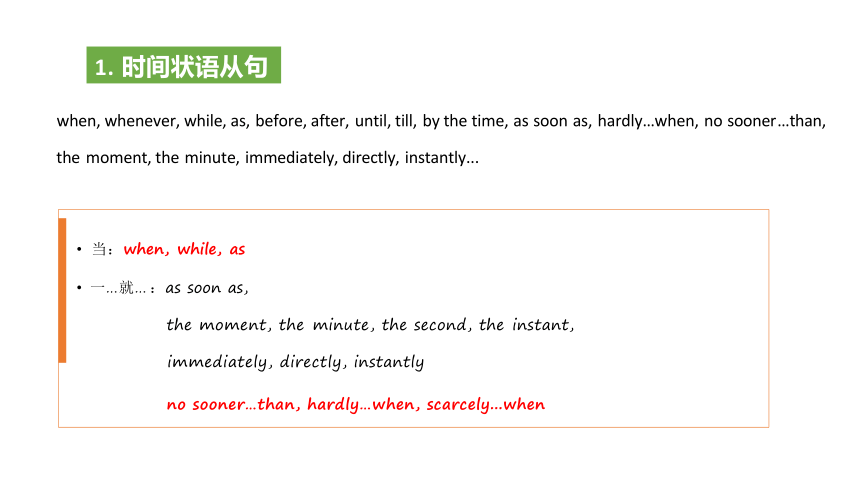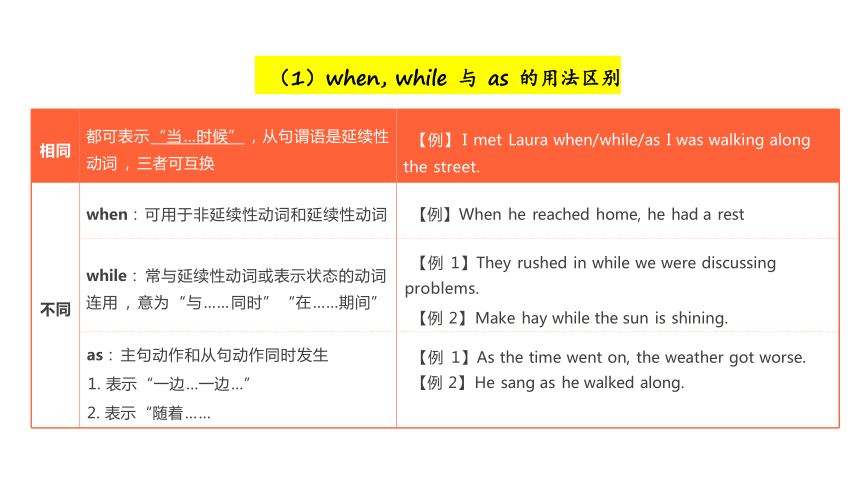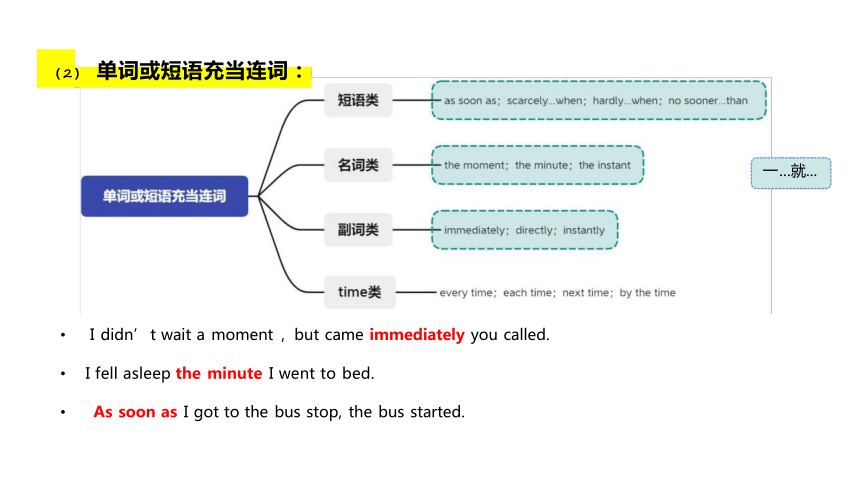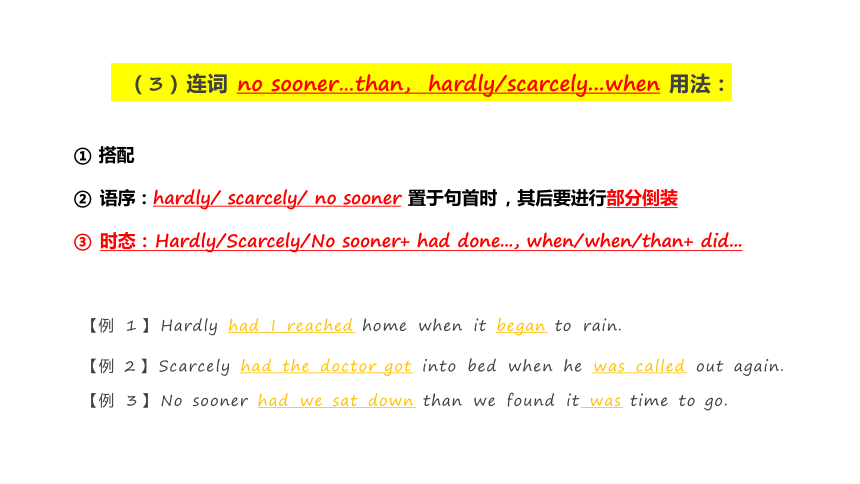高中英语 二轮专题复习 句法4-状语从句 课件
文档属性
| 名称 | 高中英语 二轮专题复习 句法4-状语从句 课件 |

|
|
| 格式 | pptx | ||
| 文件大小 | 338.2KB | ||
| 资源类型 | 试卷 | ||
| 版本资源 | 人教版(2019) | ||
| 科目 | 英语 | ||
| 更新时间 | 2025-02-27 00:00:00 | ||
图片预览







文档简介
(共19张PPT)
状语 从句
Adverbial clauses
1.时间状语从句: While John was watching TV, his wife was cooking.
2.让步状语从句: No matter how hard he tried, she could not change her mind. 3.条件状语从句: If winter comes, can spring be far behind
定义:状语修饰动词、形容词、副词或整个句子。状语从句在复合句中作状语。
分类:时间、地点、原因、 目的、结果、条件、方式、 比较、让步等。
何为状语从句?
连词常规用法 {
连词的意义
相近连词辨析
时间状语从句
条件状语从句
1、 时间状语从句
2、条件状语从句
3、让步状语从句
4、结果状语从句
5、 比较状语从句
6、原因状语从句
7、方式状语从句
8、 目的状语从句
9、地点状语从句
状语 从句 考 点
主将从现
当:when, while, as
一…就… :as soon as,
the moment, the minute, the second, the instant,
immediately, directly, instantly
no sooner…than, hardly…when, scarcely...when
when, whenever, while, as, before, after, until, till, by the time, as soon as, hardly…when, no sooner …than,
the moment, the minute, immediately, directly, instantly...
1. 时间状语从句
相同 都可表示 “当 …时候” ,从句谓语是延续性 动词 , 三者可互换
【例】 I met Laura when/while/as I was walking along the street.
不同 when: 可用于非延续性动词和延续性动词
【例】 When he reached home, he had a rest
while: 常与延续性动词或表示状态的动词 连用 , 意为 “与 …… 同时” “在 ……期间”
【例 1】They rushed in while we were discussing problems.
【例 2】 Make hay while the sun is shining.
as: 主句动作和从句动作同时发生 1. 表示 “一边 …一边 …” 2. 表示 “随着 … …
【例 1】As the time went on, the weather got worse. 【例 2】 He sang as he walked along.
(1)when, while 与 as 的用法区别
单词或短语充当连词:
一 ...就...
I didn’t wait a moment , but came immediately you called.
I fell asleep the minute I went to bed.
As soon as I got to the bus stop, the bus started.
(2)
① 搭配
② 语序:hardly/ scarcely/ no sooner 置于句首时 ,其后要进行部分倒装
③ 时态: Hardly/Scarcely/No sooner+ had done..., when/when/than+ did...
【例 1 】 Hardly had I reached home when it began to rain.
【例 2 】 Scarcely had the doctor got into bed when he was called out again. 【例 3 】 No sooner had we sat down than we found it was time to go.
~
(3) 连词 no sooner…than, hardly/scarcely...when 用法:
【例 1】Unless we have enough evidence, we can’t win the case.
【例 2】In case I'm late, start without me.
【例 3】You won’t find paper cutting difficult as long as you keep practicing it. 【例 4】 I can tell you the truth on condition that you promise to keep it a secret.
【例 5】Providing/Supposing/Given/Provided (that) you promise not to tell anyone else, I'll explain the secret.
if, unless (除非), in case (万一), so/as long as (只要), on condition that (在...条件下),
supposing(假设 ,假定, 如果 ,只要) ...当主句为将来时 ,从句通常用一般现在时表示将来。
2. 条件状语从句
定义:在时间状语从句、条件状语从句、让步状语从句中 ,如果主句表达将来含义 ,从句用一
般现在时(表示将来含义)
【例 1】 Unless we have enough evidence, we can’t win the case.
【例 2】You won’t find paper cutting difficult as long as you keep practicing it.
特殊用法: 主将从现
尽管:as, although, though, while,
无论...都...:however, whatever, whoever, whenever, wherever
no matter what, no matter how, no matter when
(1)as, although, though, while, even though, even if, however, whatever, whoever, whenever,
wherever,no matter what, no matter how, no matter when等
3. 让步状语从句
although , though 不能与 but 连用 ,但可以与 yet 连用。
【例】 Though I believe it, yet I must consider.
while 引导让步状语从句时 ,通常放在句首 ,意为“尽管”。 【例】 While I like the colour, I don't like the shape.
although :不倒装;
though: 可倒可不倒;
as: 一定倒 。( 名词 、形容词 、 副词 、分词 、 实义动词提前)
【例1】 he works hard, he makes little progress.
【例2】 Hard he works, he makes little progress.
(2) 连词 as, although, though, while 的用法区别:
注意: however/no matter how 用法
However/No matter how much she eats, she never gets fat.
However/No matter how cold it is, he always goes swimming.
① 都可以引导让步状语从句
No matter what he said, I believe him. Whatever he said, I believe him.
② 只能用 疑问词+ever 引导名词性从句
however=no matter how
whomever=no matter whom whenever=no matter when wherever=no matter where...
(3)no matter+疑问词 和 疑问词+ever 的用法区别:
I believe whatever he said.
so...that, such...that
【例 1】 He is so clever that everyone likes him.
【例 2】 He is such a clever boy that everybody likes him.
【例1】There are so many stones that no one can move them away.
【例2】 He is a little boy that he can’t control his own emotion.
名词前 many, much, few, little 等修饰,表达数量,用 so
4. 结果状语从句
注意
常用引导词:than, as …as, not so/as …as, the + 比较级 ..., the+ 比较级 ...
He is taller than his brother (is).
My hometown is as beautiful as Hangzhou (is).
He does not work as hard as his brother (does).
The harder you work, the more progress you will make.
5、 比较状语从句
He couldn’t have seen me, because I was not there.
Since he had a certain talent for composition, his English master encouraged him to write a lot.
As Chile is a long and narrow country, the temperature varies considerably from north to south.
because:语气最强, 回答why的问题。【未知原因】
since: 语气较弱【已知原因 ,句首】
as:语气次之【已知原因 ,句首】
常用引导词: because, as, since,
6、原因状语从句
in that 既然, 因为。
【例 1】 I ’m in a slightly awkward position in that he has not arrived.
now that 既然, 由于。
【例 2】 Now that John is poor and unfortunate, his friends have left him in the lurch. considering/seeing (that ) 鉴于 …事实 ,考虑
【例 3】 Seeing (that) you live next door to Mrs. Blake, you ought to be able to recognize her.
as ,as if/as though 好像
用虚拟语气表示现在不符的或与事实相反的情况
He looks sad as if he lost money.
7、 方式状语从句
n so that 和 in order that 引导目的状语从句时后常接 may, should, could, would 等情态动词 【例1】 【例2】 【例3】 John spoke through a microphone so that/in order that he could be heard in every room. In order that he could be heard in every room, John spoke through a microphone. We left the building ahead of time so that we could catch the last bus.
so that (为了...; 目的是 …), in order that (目的是...)
in case (免得 ,以防) ,for fear (that)(唯恐 ,以免 ,生怕) ,lest(唯恐 ,以免 ,生怕) ...
8. 目的状语从句
注意 位置
(1)地点状语从句通常由 where 引导 ,并且一般放在主句后边。
【例】A driver should slow down where there are schools.
(2)地点状语从句也可由 wherever, anywhere 和 everywhere 引导。
【例】 Everywhere they appeared, there were ovations.
(3)地点状语从句若放在句首 ,往往失去“地点”含义 ,翻译时要灵活处理。
【例】Wherever there is love, there is also wealth and success.只要有爱 ,就会有财富和成功。
不要和where引导的定语从句混淆。
Make a mark you don’t understand.
A. why B. in which C. what D. where
9. 地点状语从句
状语 从句
Adverbial clauses
1.时间状语从句: While John was watching TV, his wife was cooking.
2.让步状语从句: No matter how hard he tried, she could not change her mind. 3.条件状语从句: If winter comes, can spring be far behind
定义:状语修饰动词、形容词、副词或整个句子。状语从句在复合句中作状语。
分类:时间、地点、原因、 目的、结果、条件、方式、 比较、让步等。
何为状语从句?
连词常规用法 {
连词的意义
相近连词辨析
时间状语从句
条件状语从句
1、 时间状语从句
2、条件状语从句
3、让步状语从句
4、结果状语从句
5、 比较状语从句
6、原因状语从句
7、方式状语从句
8、 目的状语从句
9、地点状语从句
状语 从句 考 点
主将从现
当:when, while, as
一…就… :as soon as,
the moment, the minute, the second, the instant,
immediately, directly, instantly
no sooner…than, hardly…when, scarcely...when
when, whenever, while, as, before, after, until, till, by the time, as soon as, hardly…when, no sooner …than,
the moment, the minute, immediately, directly, instantly...
1. 时间状语从句
相同 都可表示 “当 …时候” ,从句谓语是延续性 动词 , 三者可互换
【例】 I met Laura when/while/as I was walking along the street.
不同 when: 可用于非延续性动词和延续性动词
【例】 When he reached home, he had a rest
while: 常与延续性动词或表示状态的动词 连用 , 意为 “与 …… 同时” “在 ……期间”
【例 1】They rushed in while we were discussing problems.
【例 2】 Make hay while the sun is shining.
as: 主句动作和从句动作同时发生 1. 表示 “一边 …一边 …” 2. 表示 “随着 … …
【例 1】As the time went on, the weather got worse. 【例 2】 He sang as he walked along.
(1)when, while 与 as 的用法区别
单词或短语充当连词:
一 ...就...
I didn’t wait a moment , but came immediately you called.
I fell asleep the minute I went to bed.
As soon as I got to the bus stop, the bus started.
(2)
① 搭配
② 语序:hardly/ scarcely/ no sooner 置于句首时 ,其后要进行部分倒装
③ 时态: Hardly/Scarcely/No sooner+ had done..., when/when/than+ did...
【例 1 】 Hardly had I reached home when it began to rain.
【例 2 】 Scarcely had the doctor got into bed when he was called out again. 【例 3 】 No sooner had we sat down than we found it was time to go.
~
(3) 连词 no sooner…than, hardly/scarcely...when 用法:
【例 1】Unless we have enough evidence, we can’t win the case.
【例 2】In case I'm late, start without me.
【例 3】You won’t find paper cutting difficult as long as you keep practicing it. 【例 4】 I can tell you the truth on condition that you promise to keep it a secret.
【例 5】Providing/Supposing/Given/Provided (that) you promise not to tell anyone else, I'll explain the secret.
if, unless (除非), in case (万一), so/as long as (只要), on condition that (在...条件下),
supposing(假设 ,假定, 如果 ,只要) ...当主句为将来时 ,从句通常用一般现在时表示将来。
2. 条件状语从句
定义:在时间状语从句、条件状语从句、让步状语从句中 ,如果主句表达将来含义 ,从句用一
般现在时(表示将来含义)
【例 1】 Unless we have enough evidence, we can’t win the case.
【例 2】You won’t find paper cutting difficult as long as you keep practicing it.
特殊用法: 主将从现
尽管:as, although, though, while,
无论...都...:however, whatever, whoever, whenever, wherever
no matter what, no matter how, no matter when
(1)as, although, though, while, even though, even if, however, whatever, whoever, whenever,
wherever,no matter what, no matter how, no matter when等
3. 让步状语从句
although , though 不能与 but 连用 ,但可以与 yet 连用。
【例】 Though I believe it, yet I must consider.
while 引导让步状语从句时 ,通常放在句首 ,意为“尽管”。 【例】 While I like the colour, I don't like the shape.
although :不倒装;
though: 可倒可不倒;
as: 一定倒 。( 名词 、形容词 、 副词 、分词 、 实义动词提前)
【例1】 he works hard, he makes little progress.
【例2】 Hard he works, he makes little progress.
(2) 连词 as, although, though, while 的用法区别:
注意: however/no matter how 用法
However/No matter how much she eats, she never gets fat.
However/No matter how cold it is, he always goes swimming.
① 都可以引导让步状语从句
No matter what he said, I believe him. Whatever he said, I believe him.
② 只能用 疑问词+ever 引导名词性从句
however=no matter how
whomever=no matter whom whenever=no matter when wherever=no matter where...
(3)no matter+疑问词 和 疑问词+ever 的用法区别:
I believe whatever he said.
so...that, such...that
【例 1】 He is so clever that everyone likes him.
【例 2】 He is such a clever boy that everybody likes him.
【例1】There are so many stones that no one can move them away.
【例2】 He is a little boy that he can’t control his own emotion.
名词前 many, much, few, little 等修饰,表达数量,用 so
4. 结果状语从句
注意
常用引导词:than, as …as, not so/as …as, the + 比较级 ..., the+ 比较级 ...
He is taller than his brother (is).
My hometown is as beautiful as Hangzhou (is).
He does not work as hard as his brother (does).
The harder you work, the more progress you will make.
5、 比较状语从句
He couldn’t have seen me, because I was not there.
Since he had a certain talent for composition, his English master encouraged him to write a lot.
As Chile is a long and narrow country, the temperature varies considerably from north to south.
because:语气最强, 回答why的问题。【未知原因】
since: 语气较弱【已知原因 ,句首】
as:语气次之【已知原因 ,句首】
常用引导词: because, as, since,
6、原因状语从句
in that 既然, 因为。
【例 1】 I ’m in a slightly awkward position in that he has not arrived.
now that 既然, 由于。
【例 2】 Now that John is poor and unfortunate, his friends have left him in the lurch. considering/seeing (that ) 鉴于 …事实 ,考虑
【例 3】 Seeing (that) you live next door to Mrs. Blake, you ought to be able to recognize her.
as ,as if/as though 好像
用虚拟语气表示现在不符的或与事实相反的情况
He looks sad as if he lost money.
7、 方式状语从句
n so that 和 in order that 引导目的状语从句时后常接 may, should, could, would 等情态动词 【例1】 【例2】 【例3】 John spoke through a microphone so that/in order that he could be heard in every room. In order that he could be heard in every room, John spoke through a microphone. We left the building ahead of time so that we could catch the last bus.
so that (为了...; 目的是 …), in order that (目的是...)
in case (免得 ,以防) ,for fear (that)(唯恐 ,以免 ,生怕) ,lest(唯恐 ,以免 ,生怕) ...
8. 目的状语从句
注意 位置
(1)地点状语从句通常由 where 引导 ,并且一般放在主句后边。
【例】A driver should slow down where there are schools.
(2)地点状语从句也可由 wherever, anywhere 和 everywhere 引导。
【例】 Everywhere they appeared, there were ovations.
(3)地点状语从句若放在句首 ,往往失去“地点”含义 ,翻译时要灵活处理。
【例】Wherever there is love, there is also wealth and success.只要有爱 ,就会有财富和成功。
不要和where引导的定语从句混淆。
Make a mark you don’t understand.
A. why B. in which C. what D. where
9. 地点状语从句
